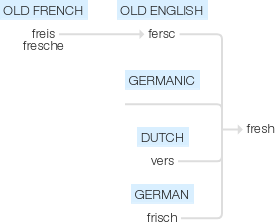Fresh
Old English fersc ‘not salt, fit for drinking’, superseded in Middle English by forms from Old French freis, fresche ; both ultimately of Germanic origin and related to Dutch vers and German frisch .
wiktionary
From Middle English fressh, from Old English fersc(“fresh, pure, sweet”), from Proto-West Germanic *frisk(“fresh”), from Proto-Germanic *friskaz(“fresh”), from Proto-Indo-European *preysk-(“fresh”).
Cognate with Scots fresch(“fresh”), West Frisian farsk(“fresh”), Dutch vers(“fresh”), Walloon frexh(“fresh”), German frisch(“fresh”), French frais(“fresh”), Norwegian and Danish frisk(“fresh”), fersk, Icelandic ferskur(“fresh”), Lithuanian prėskas(“unflavoured, tasteless, fresh”), Russian пре́сный(présnyj, “sweet, fresh, unleavened, tasteless”). Doublet of fresco.
Slang sense possibly shortened form of “fresh out the pack”, 1980s routine by Grand Wizzard Theodore. [1] [2]
1848, US slang, probably from German frech(“impudent, cheeky, insolent”), from Middle High German vrech(“bold, brave, lively”), from Old High German freh(“greedy, eager, avaricious, covetous”), from Proto-Germanic *frekaz(“greedy, outrageous, courageous, capable, active”), from Proto-Indo-European *(s)pereg-(“to be quick, twitch, sprinkle, splash”). Cognate with Old English frec(“greedy; eager, bold, daring; dangerous”) and Danish fræk(“naughty”). More at freak.
etymonline
fresh (adj.1)
c. 1200, fresh, also fersh, "unsalted; pure; sweet; eager;" the modern form is a metathesis of Old English fersc, of water, "not salt, unsalted," itself transposed from Proto-Germanic *friskaz (source also of Old Frisian fersk, Middle Dutch versch, Dutch vers, Old High German frisc, German frisch "fresh"). Probably cognate with Old Church Slavonic presinu "fresh," Lithuanian preskas "sweet."
Sense of "new, recent" is from c. 1300; that of "not stale or worn" is from early 14c.; of memories from mid-14c. The metathesis, and the expanded Middle English senses of "new," "pure," "eager" probably are by influence of (or from) Old French fres (fem. fresche; Modern French frais "fresh, cool"), which is from Proto-Germanic *frisko-, and thus related to the English word. The Germanic root also is the source of Italian and Spanish fresco. Related: Freshly. Fresh pursuit in law is pursuit of the wrong-doer while the crime is fresh.
fresh (adj.2)
"impudent, presumptuous," or as Century Dictionary puts it, "verdant and conceited," 1848, U.S. slang, probably from German frech "insolent, cheeky," from Old High German freh "covetous," related to Old English frec "greedy, bold" (see freak (n.2)).
